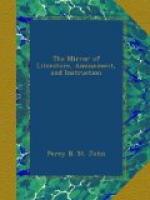greatness to atrocious villany. We admire the
courage of Macbeth, the ability of Richard, the craft
and dexterity of Iago, and the stubborn energy of
Shylock,—but we never applaud, nor wish
to emulate. We see them too truly as they are.
The Author of Waverley, though he approaches nearer
to the fault in question than Shakspeare, can never
be fairly said to have committed it. Cleveland,
Robertson, Rashleigh, Christian, might, by a few touches
added, and a few expunged, become very captivating
villains, and produce a brisk fermentation of mischief
in many young and weak heads. But of such false
touches and suppressions of truth, the author has not
been guilty. He has not disguised their vices
and their weaknesses,—he has not endowed
them with incompatible virtues; but, just favouring
them charitably, so as to take off the edge of our
dislike, has exhibited them nearly as they must necessarily
have been. The same discretion is observable
in his impersonation of those equivocal characters
in humble life which he has invested with an interest
hitherto unknown. Meg Merrilies, Madge Wildfire,
Ratclifte, and the Smuggler in Redgauntlet, are characters
in whom are found redeeming traits of the best feeling,
and which, therefore, interest us deeply. Yet
all of them are more or less at war with order and
the institutions of society, and must fall under its
heavy ban. And, interested as we are, we are never
led to deem the censures of society unjust, or to
take part with them in their war against it.
Style.
Beauty of style is not one of Sir Walter Scott’s
chief merits. His choice of expressions is, however,
better than his disposition of them. His sentences
are too full of expletives,—too long, and
loosely arranged; exuberant, like his fancy, and untrimmed,
as if never subjected to a process of compression,—a
limae labor, perhaps incompatible with the
wonderful expedition with which work after work has
issued from the press. This facility of production
is too remarkable to be overlooked. It is almost
unexampled. Voltaire and Lord Byron have written
some of their best works in an inconceivably short
time. Dryden produced five act plays at the rate
of three a-year. Shakspeare is supposed in one
year to have written five, among which is that whereon
he must have expended most thought—Hamlet.
This, considering the value of the productions, would
perhaps be the greatest feat on record, if we could
be sure that the plays had been wholly invented and
written within the twelve-month—but this
cannot be ascertained. Nevertheless, for long
continued fertility of pen, perhaps Sir Walter Scott
may be safely said to have never been exceeded.




